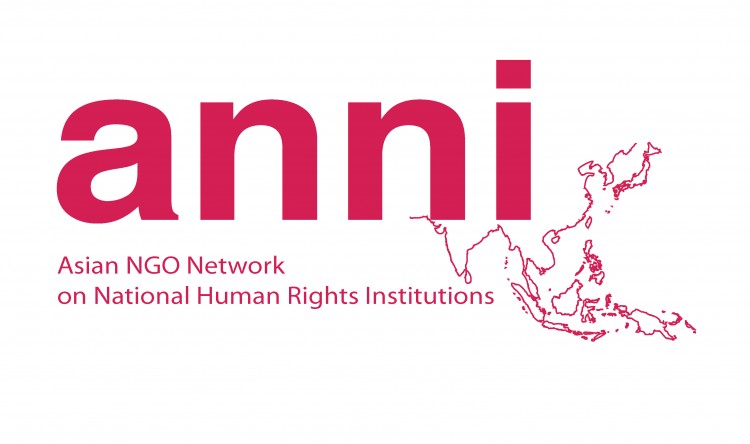27 January 2015
Dr. Byung-cheol Hyun
Chairperson
National Human Rights Commission of Korea (NHRCK) Gumsegi Bldg., 6, Mugyo-ro, Jung-gu,
Seoul 100-842, Korea
Tel : +82-2-2125-9700, Fax : +82-2-2125-9718
E-mail : [email protected], [email protected]
Dear Dr. Hyun,
Re: Concern over NHRK’s lack of Substantial Efforts in Addressing ICC-SCA’s Recommendations
I write to you on behalf of the Asian NGO Network on National Human Rights Institutions (ANNI) ahead of the forthcoming re-accreditation review of the National Human Rights Commission of Korea (NHRCK) from 16-20 March 2015, after the International Coordinating Committee Sub-Committee on Accreditation (ICC- SCA) twice deferred the determination of your organization’s status.
The repeated deferral of the NHRCK’s review by the ICC-SCA indicates deep-seated concerns with the NHRCK’s lack of institutional compliance with the Paris Principles both in law and practice. The ICC-SCA Report (October 2014) highlights issues relating to the selection and appointment process, lack of immunity from legal liability and the lack of cooperation with civil society actors, among others.
The ANNI notes several measures undertaken by the NHRCK in response to the concerns, which include convening an internal working group as well as consultations with selected civil society organizations to deliberate and submit amendments on the NHRC Act.
However, the ANNI stresses that these cosmetic gestures do not amount to robust measures or safeguards to secure the independence, accountability and effectiveness of the NHRCK. For example, the continued exclusion of civil society and absence of a clear, transparent and participatory process for the selection of Commissioners in relevant legislation or binding administrative guidelines are conspicuous flaws that remain unaddressed adequately.
The controversial recent appointment of Commissioner Choi Ee-woo in December 2014 is a case in point. It once again did not involve broad consultation and participation of civil society in the application, screening and selection process. This is compounded by evidence that Mr. Choi has notably made comments or taken positions that openly endorse discrimination on the grounds of sexual orientation and gender identity in the past.
Clearly, the proposed changes still fall substantially short of the minimum standards stipulated by the Paris Principles and ICC-SCA General Observations. Furthermore, the other proposed amendments to the NHRCK Act conveniently avoid pertinent issues relating to pluralism and functional immunity, despite being raised repeatedly by the ICC-SCA since 2008. Taken together, such practices continue to compromise the real and perceived independence of the NHRCK.
It is thus highly disingenuous for the NHRCK to suggest during the Commission’s Plenary Committee meeting on 12 January that civil society actors are unduly critical and bringing disrepute to the NHRCK by engaging with the ICC through stakeholder submissions and communications.
The NHRCK should be fully aware the review process is also extended to concerned stakeholders, particularly from civil society, as it contributes to the transparency and rigor of the evaluation. The Rules of Procedure (3.6) for the ICC-SCA are incorporated into ICC Statute and expressly authorize civil society organizations to provide relevant information pertaining to the accreditation review.
While recommendations pertaining to legislative change are not within the power of the NHRI and require the support of the government, the NHRCK has not actively advocated for the necessary amendments to fundamental deficiencies in the NHRC Act over the past five years. The ANNI reminds the NHRCK that the re-accreditation review is not a face-saving or public relations exercise. The NHRCK and government must ensure effective implementation of the recommendations to remedy the credibility and public legitimacy deficit. Only then can the NHRCK meaningfully fulfil its role for human rights protection and governance in the country.
Thank you for your attention. We look forward to your positive response regarding this matter.
Yours sincerely,
Evelyn Balais-Serrano
Executive Director
Asian Forum for Human Rights and Development (FORUM-ASIA)
About ANNI:
The Asian NGOs Network on National Human Rights Institutions (ANNI) was established in December 2006. It is a network of Asian NGOs and human rights defenders working on issues relating to National Human Rights Institutions (NHRIs). ANNI is composed of members that are national organizations from all over Asia. ANNI currently has 30 member organizations from 17 countries or territories. The work of the ANNI members focus on strengthening the work and functioning of Asian NHRIs to better promote and protect human rights as well as to advocate for the improved compliance of Asian NHRIs with international standards, including the Paris Principles and General Observations of the Sub-Committee on Accreditation (SCA) of the International Coordinating Committee (ICC).
The Asian Forum for Human Rights and Development (FORUM-ASIA) is the Secretariat of ANNI. FORUM-ASIA has Consultative Status with the ECOSOC (UN Economic and Social Council) since 2004.
CC:
M Kieren Fitzpatrick
Director
Asia Pacific Forum of National Human Rights Institutions (APF)
M David Langtry
Chairperson
Sub-Committee on Accreditation, International Coordinating Committee of National Human Rights Institutions (ICC-SCA)
M Vladlen Stefanov
Chief, National Institutions and Regional Mechanisms Section,Office of the United Nations High
Commissioner for Human Rights (OHCHR)




